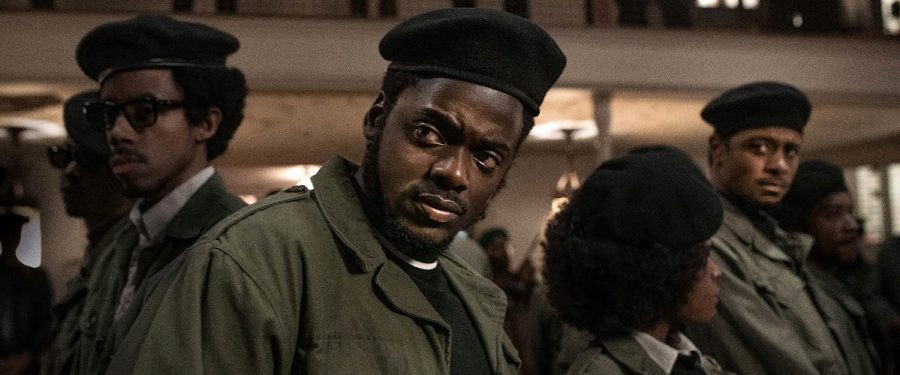Though not comprehensive on Fred Hampton’s life and the Black Panthers’ politics, Shaka King’s “Judas and the Black Messiah” is a great, stylized introduction to America’s most successful Marxist-Leninist movement.
Upon learning that Hollywood made a film centered around the Chicago Black Panther Party, Fred Hampton and his assassination, I was quite apprehensive as to what approach would be taken in telling Hampton’s story. So many of the radical stances the Panthers took in could be rewritten in favor of a more mainstream, “audience-friendly” version.
However, I was pleasantly surprised.
The film follows the story of William “Bill” O’Neal, played by LaKeith Stanfield, a man offered a plea deal by the FBI to infiltrate the Chicago Black Panther Party to gather intelligence on the party’s charismatic chairman Hampton, played by Daniel Kaluuya.
King’s star-studded cast pay great homage to the young revolutionaries willing to change the material conditions of those around them by all means necessary. Kaluuya’s portrayal of Fred Hampton is riveting; from his manner of speech to his gestures, his performance enthralls.
Stanfield on the other hand plays a great counterbalance to the young revolutionary leader as an FBI informant. His performance allows viewers to grow resentment for the dirty tactics the feds are executing on the group.
Two other note-worthy performances come from Dominique Fishback as Deborah Johnson, and Jesse Plemons as FBI agent Roy Mitchell. As Johnson, Fishback grants viewers a view of the vulnerable side of Hampton. Johnson is a safe haven for him, but she is also a revolutionary. She bears the weight of caring for the man she loves, destined to die a martyr, and struggles as an expectant mother to his child. Plemons is the perfect antagonist as Agent Mitchell. Plemons perfectly captures the evil doings of the divide and conquer tactics of the COINTELPRO program that was also applied to various revolutionary groups in its active period.
The cinematography of the film is also noteworthy. Sean Bobbit, who also shot “12 Years a Slave,” does a great job highlighting color pallets which encapsulate the fighting times of the ‘60s. Greens are subtle but highlighted when the Panthers are on screen, reminiscent of the Cuban revolutionaries the Panthers took inspiration from. Memorable shots include the film’s opening, a long tracking shot of O’Neal getting into a bar altercation and Hampton climbing the steps to the podium after his release from incarceration.
Although the film mostly does justice to the story of the assassination of Fred Hampton, it also seems to minimize the Panthers’ actual political views which were so essential to the party’s core and coalition building. Aside from a few quotes thrown around from Mao Tse-Tung or Che Guevara, not once does the film mention their Marxist-Leninist leanings or their vocal stance on anti-imperialism. These principles were essential to the party and are what caused so much worry on the part of the government.
The fact that the Black Panther Party was gaining so much popularity whilst still maintaining its Marxist roots created a state of disarray in Washington. These points are seldom mentioned in the movie, if at all.
Curiously, as the movie rolls out on streaming platforms, we’re seeing issues the Panthers and Hampton would be quick to point out. Currently, there are renewed calls to rename the FBI headquarters in Washington, D.C., currently named after J. Edgar Hoover. However, this wouldn’t solve anything for the victims of the COINTELPRO program or other groups the FBI has targeted in the past, or for Black Panthers still behind bars, like Mumia Abu-Jamal.
Furthermore, with its $26 million budget, the film has more than enough money to put into causes that could actually create material change, or even preserve part of its history. Around the first couple of weeks of the movie’s release, Fred Hampton’s childhood home, which serves as a site for community organizing, was in need of funds to be saved from auction by U.S. Bank.
In King’s film, in one of Hampton’s opening speeches, he calls out this “candy-coated facade of gradual-reforms” and maybe the studio heads, writers and production team should take notice of it.
Despite its contradictions, the film should be praised for properly characterizing the Panthers as radicals and activists. Shaka King’s “Judas and The Black Messiah” has outstanding performances and visuals and it’s a movie that should be viewed by all.
“Judas and The Black Messiah” is streaming on HBO Max.





Christian mendez • Mar 9, 2021 at 4:44 pm
Very insightful!